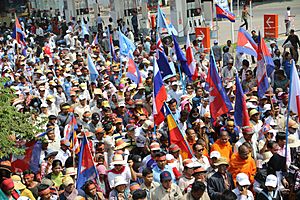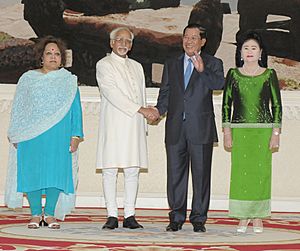Hun Sen facts for kids
Quick facts for kids
Samdech Akka Moha Sena Padei Techo
Hun Sen
|
|
|---|---|
| ហ៊ុន សែន | |
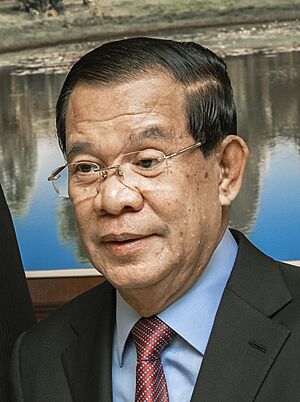
Hun Sen in 2024
|
|
| 4th President of the Senate | |
| Assumed office 3 April 2024 |
|
| Monarch | Norodom Sihamoni |
| Vice President | Prak Sokhonn (2024) Ouch Borith Thun Vathana |
| Preceded by | Say Chhum |
| Prime Minister of Cambodia | |
| In office 30 November 1998 – 22 August 2023 |
|
| Monarch |
|
| Deputy |
See list
Sar Kheng
Hor Namhong (2004–2023) Tea Banh (2004–2023) Bin Chhin (2007–2023) Yim Chhaily (2008–2023) Men Sam An (2008–2023) Ke Kim Yan (2009–2023) Prak Sokhonn (2018–2023) Aun Pornmoniroth (2018–2023) Chea Sophara (2018–2023) |
| Preceded by | Ung Huot (as First Prime Minister) |
| Succeeded by | Hun Manet |
| In office 14 January 1985 – 2 July 1993 Acting: 26 December 1984 – 14 January 1985 |
|
| President |
|
| Deputy |
See list
Himself
(1984–1985) Bou Thang (1984–1992) Chea Soth (1984–1992) Sar Kheng (1984–1992) |
| Preceded by | Chan Sy (as Prime Minister of the People's Republic of Kampuchea) |
| Succeeded by | Norodom Ranariddh (as First Prime Minister of Cambodia) |
| Second Prime Minister of Cambodia | |
| In office 2 July 1993 – 30 November 1998 |
|
| Monarch | Norodom Sihanouk |
| Deputy | Sar Kheng |
| First Prime Minister |
|
| Preceded by | Office restored |
| Succeeded by | Himself (as Prime Minister) |
| President of the Cambodian People's Party | |
| Assumed office 20 June 2015 |
|
| Vice President |
|
| Preceded by | Chea Sim |
| Chairman of the Supreme Advisory Council of the King of Cambodia | |
| Assumed office 22 August 2023 |
|
| Monarch | Norodom Sihamoni |
| Minister of Foreign Affairs | |
| In office 1988–1990 |
|
| Prime Minister | Himself |
| Preceded by | Kong Korm |
| Succeeded by | Hor Namhong |
| In office 8 January 1979 – December 1986 |
|
| Prime Minister |
|
| Preceded by | Ieng Sary |
| Succeeded by | Kong Korm |
| Deputy Prime Minister of the People's Republic of Kampuchea | |
| In office 1981–1985 |
|
| President | Heng Samrin |
| Prime Minister |
|
| Member of the National Assembly | |
| In office 14 June 1993 – 2 April 2024 |
|
| Constituency | Kampong Cham (1993–1998) Kandal (1998–2024) |
| Personal details | |
| Born |
Hun Bunal
5 August 1952 Peam Kaoh Sna, Cambodia |
| Political party | Cambodian People's Party |
| Spouse |
Bun Rany
(m. 1976) |
| Children | 6, including Manet, Manith, and Many |
| Parents | Hun Neang Dee Yon |
| Alma mater | (Vietnam) National Academy of Public Administration |
| Awards | Grand Order of National Merit |
| Signature |  |
| Military service | |
| Allegiance | Democratic Kampuchea People's Republic of Kampuchea State of Cambodia Kingdom of Cambodia |
| Branch/service | Khmer Rouge Kampuchean United Front for National Salvation Kampuchean People's Revolutionary Army Cambodian People's Army Royal Cambodian Army |
| Years of service | 1970–1999 |
| Rank | General of the Army |
| Commands | Democratic Kampuchea – Eastern Region |
| Battles/wars | Cambodian Civil War (WIA) Cambodian–Vietnamese War 1997 Cambodian coup d'état |
Samdech Hun Sen (born August 5, 1952) is a Cambodian politician and former military officer. He is currently the President of the Senate in Cambodia. He was also the prime minister of Cambodia for a very long time, from 1985 to 1993 and again from 1998 to 2023. This makes him the longest-serving leader in Cambodia's history.
Hun Sen leads the Cambodian People's Party (CPP), which has been in charge of Cambodia since 1979. He has been a member of the Senate since 2024. His full honorary title is Samdech Akka Moha Sena Padei Techo Hun Sen, which means "Lord Prime Minister and Supreme Military Commander Hun Sen."
He was born Hun Bunal but changed his name to Hun Sen in 1972. He joined the Khmer Rouge as a soldier and fought in the Cambodian Civil War. Later, he joined forces with Vietnamese troops in the Cambodian–Vietnamese War. From 1979 to 1990, he served as Cambodia's Foreign Minister. He was one of the youngest foreign ministers in the world at age 26.
Contents
Early Life and Education
Hun Sen was born on August 5, 1952, in Peam Kaoh Sna, Kampong Cham. He was the third of six children. His father, Hun Neang, was a monk before he married Hun Sen's mother, Dee Yon. His family had some land and lived comfortably for a while.
When he was 13, Hun Sen left his family to study at a monastic school in Phnom Penh. At this time, he changed his name to Ritthi Sen or simply Sen. He later earned a master's degree in public administration from the National Academy of Public Administration in Vietnam.
Military Career and Entry into Politics
In 1970, when Lon Nol took power from Norodom Sihanouk, Hun Sen stopped his education. He joined the Khmer Rouge after Sihanouk asked people to join the fight. Hun Sen said he had no strong political ideas at that time. He changed his name again to Hun Samrach to hide his identity.
Two years later, he changed his name to Hun Sen. He said his previous name brought him bad luck, as he was wounded several times. Hun Sen quickly moved up in the military. He was injured during the fall of Phnom Penh in 1975 and lost sight in one eye.
In 1977, Hun Sen and his soldiers left the Khmer Rouge and went to Vietnam. When Vietnam prepared to invade Cambodia, Hun Sen became a leader in the rebel army supported by Vietnam.
After the Khmer Rouge was defeated, Hun Sen became Deputy Prime Minister and Foreign Minister in 1979. He was only 26 years old.
First Time as Prime Minister (1985–1993)
Hun Sen first became Prime Minister in January 1985. The National Assembly chose him to take over after Chan Sy passed away. As the leader of Cambodia, he was elected Chairman of the Council of Ministers and Prime Minister in 1985. During this time, he managed ongoing conflicts against various rebel groups.
Peace Talks and UN Involvement (1991–1993)
As Foreign Minister and then Prime Minister, Hun Sen helped with the 1991 Paris Peace Accords. These talks brought peace to Cambodia and ended the Cambodian–Vietnamese War.
He remained Prime Minister during the time of the United Nations Transitional Authority in Cambodia (UNTAC). This was until the 1993 elections, which were supported by the UN. The opposition party, FUNCINPEC, won most of the votes. However, Hun Sen did not accept the results at first.
After discussions, Norodom Ranariddh and Hun Sen agreed to share power. Ranariddh became the First Prime Minister, and Hun Sen became the Second Prime Minister.
Power Struggle in 1997
In 1997, the power-sharing agreement became unstable. There were disagreements between Ranariddh and Hun Sen. Hun Sen then took control in 1997, replacing Ranariddh with Ung Huot as the First Prime Minister. Hun Sen kept his position as the Second Prime Minister.
Prime Minister of Cambodia (1998–2023)
In the 1998 election, Hun Sen led the CPP to victory. They formed a new government with FUNCINPEC. In the 2003 elections, the CPP won even more seats. Hun Sen became the sole Prime Minister again in 2004.
Protests in 2013–2014
After the July 2013 elections, both Hun Sen and the opposition party claimed they had won. People in Cambodia and other countries protested peacefully. They asked the United Nations to investigate claims of voting problems.
In September 2013, thousands of protesters gathered in Phnom Penh. Some clashed with police. Hun Sen stated that he was legally elected and would not step down. In January 2014, police opened fire on protesters, causing injuries and deaths. The United Nations and the US government spoke out against the violence.
Strengthening Power (2015–2023)
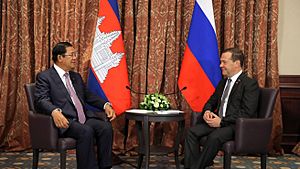
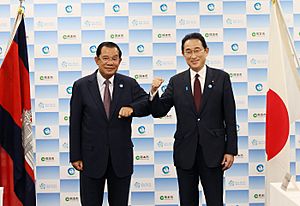
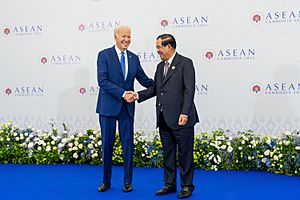
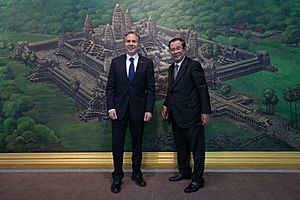
In 2017, the National Assembly voted to remove the positions of Minority and Majority Leader. This reduced the opposition party's power. A new law was passed that allowed the ruling party to dissolve other political parties. The main opposition party was later dissolved.
In 2018, Hun Sen appointed his son, Hun Manet, to higher military positions. Hun Sen said his son could become prime minister if elected. The 2018 elections were seen by some as unfair because the main opposition party was not allowed to participate.
During the early part of the COVID-19 pandemic, Hun Sen's government worked closely with China. China provided many vaccines and medical supplies to Cambodia. This helped Cambodia have one of the highest vaccination rates in Southeast Asia.
In July 2023, Hun Sen warned Ukraine about using cluster bombs. He spoke about Cambodia's own difficult experiences with such weapons from the Vietnam War. After the 2023 elections, the King confirmed that Hun Manet would become the new prime minister.
Concerns about Land and Wealth
There have been concerns about land deals in Cambodia. Hun Sen's government leased a large amount of land, often to foreign investors. This led to many Cambodians being forced to move from their homes. These land sales have been seen by some as government corruption. Cambodia has also experienced a lot of forest loss.
Human Rights Discussions
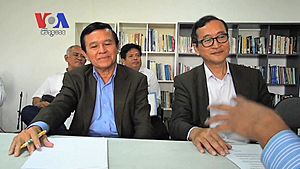
Hun Sen has often spoken strongly against political opponents. He has said that strong actions are needed to keep peace in Cambodia. Public gatherings have been banned, and opposition supporters have faced difficulties.
President of the Senate (2024–Present)
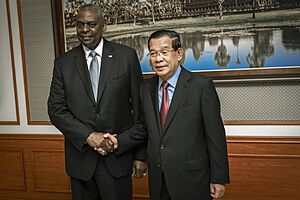
The Cambodian People's Party won a large victory in the 2024 Senate election. This made it possible for Hun Sen to become the President of the Senate. He left his seat in the National Assembly on April 2, 2024, to join the Senate. On April 3, the Senate officially confirmed him as its president.
Control of Media
Over time, Hun Sen and the CPP have gained strong control over media in Cambodia. This includes social media, which many Cambodians use for news.
Television, Radio, and Newspapers
Several TV stations in Cambodia are owned by people connected to Hun Sen's family or the CPP. For example, Bayon Television is owned by Hun Mana, Hun Sen's eldest daughter.
In 2017, some radio stations were stopped from broadcasting international news programs. The Cambodia Daily, a well-known independent newspaper, closed in September 2017. Another independent newspaper, The Phnom Penh Post, was sold in 2018 to an investor linked to Hun Sen. This made it less independent.
Social Media and Facebook
Facebook became very popular in Cambodia in the 2010s. Hun Sen and the CPP started using Facebook a lot. Hun Sen's official page had millions of followers.
However, Facebook activity in Cambodia is watched by authorities. People who criticize the government on Facebook have sometimes been arrested. In June 2023, Hun Sen deleted his Facebook account. This happened after Facebook's Oversight Board suggested he should be temporarily banned from the platform for a video post.
Personal Life
Hun Sen is married to Bun Rany. They have six children, including one adopted daughter. Their children include Manet, Mana, Manith, Mani, and Mali. All three of Hun Sen's sons play important roles in the government.
Hun Sen speaks Khmer and is also fluent in Vietnamese. He also knows some English. He is blind in one eye due to an injury he got in 1975. He uses an artificial eye.
Hun Sen is a Buddhist. He has given money to help repair many pagodas, which are Buddhist temples.
For many years, Hun Sen used April 4, 1951, as his official birthdate. However, he changed it to August 5, 1952, in June 2022. He did this because of a Cambodian belief that having the wrong birthdate can cause problems. Many Cambodians have two birthdates because they lost their birth certificates during the Khmer Rouge era.
Awards and Honors
Hun Sen has received many awards and honors from Cambodia and other countries. These include:
- Grand Order of National Merit (Cambodia)
- Grand Cross of the Royal Order of Cambodia
- Order of José Martí (Cuba)
- Gold Medal of the Nation (Laos)
- Grand Cross of the Order of Sikatuna (Philippines)
- Order of Friendship (Russia)
- Knight Special Grand Cordon of the Order of the White Elephant (Thailand)
- Member 3rd Class of the Order of Prince Yaroslav the Wise (Ukraine)
See also
 In Spanish: Hun Sen para niños
In Spanish: Hun Sen para niños
- Modern Cambodia
- Politics of Cambodia
- People's Republic of Kampuchea
 | William M. Jackson |
 | Juan E. Gilbert |
 | Neil deGrasse Tyson |


